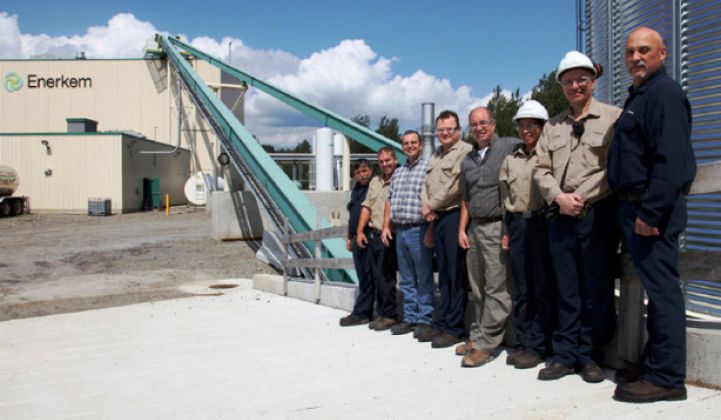For the past few years, VCs and startup execs have said that the biofuel market will start to take off when large, established companies finally decide to commit themselves.
The beginning of that phase may finally be occurring.
Enerkem, which turns municipal garbage into fuels, announced that Waste Management and Valero were part of a $60 million investment round today. Enerkem essentially heats waste, creates a synthetic gas with it, and then converts that gas into a liquid. (That's a diagram of its process in the illustration.)
Also today, Zeachem, which makes cellulosic ethanol in a highly efficient manner from poplar trees or eucalyptus, signed an open-ended development deal with Procter & Gamble.
All three of these large companies have been involved in green chemistry and biofuels for some time. P&G has a strategic development agreement with LS9 while Waste Management -- the General Electric of Garbage -- has invested in, among others, Genomatica and will work with the startup to develop microbes that can generate fuel from landfills.
Valero, meanwhile, bought ethanol facilities from VeraSun for $500 million back in 2009. It also invested in Algenol, an algae company.
Gevo, Amyris and Solazyme have all successfully held IPOs in the recent past.
But don't get too excited yet. In fuel and chemicals, things take time. Potential buyers test new molecules and manufacturing processes elaborately. So far, only a few of the investments that oil companies have made in startups have panned out. Other than the investments in BrightSource Energy, a solar company, and Solazyme by Chevron's venture group, I can't think of many that have done well. (Side note: Exxon developed the lithium-ion battery in the mid-'70s but dropped it. A few years later, Sony came up with its own and made a multibillion dollar business out of it.)
Gevo, Amyris and Solazyme also all continue to lose money. Gevo and Amyris get most of their current revenue from conventional alternative fuels.
Some of these investments arguably are symbolic commitments. In January, Valero said it might invest up to $50 million in Mascoma, which makes genetically modified organisms that produce fuel from wood waste. The commitment, however, is nonbinding: Valero could end up investing almost nothing in the company.
Valero also backed Proposition 23 in California, which would have rolled back the state's carbon regulations.
Nonetheless, with oil over $100 a barrel, interest in biofuels will likely continue to grow. The last time oil was at this level was 2008: only the economic crash brought the price down. Barring another cataclysm, the lofty price of oil could create a more persistent price floor for the bio industry.



